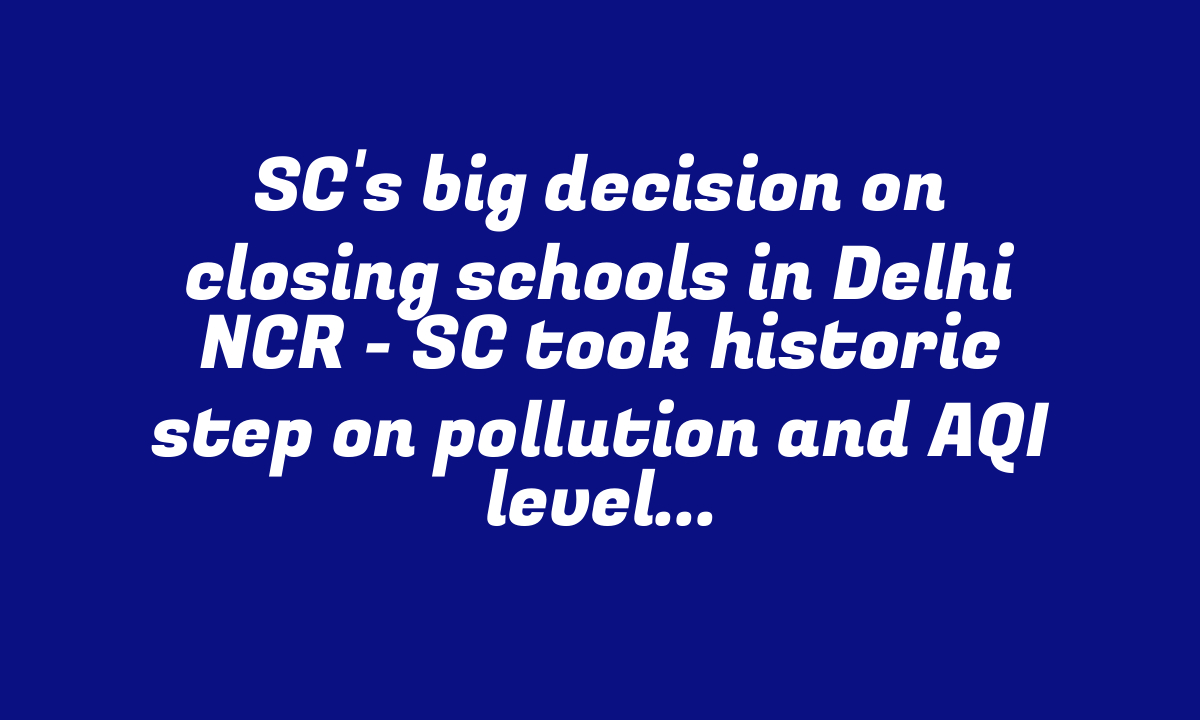The situation of air pollution in Delhi and National Capital Region (NCR) is continuously worsening. Recently, the Supreme Court has given a big decision keeping this serious problem in mind. All schools of Delhi NCR closed Order has been issued, and all classes online mode Instructions have been given to shift.
This decision was taken when Delhi Air Quality Index (AQI) Reached dangerous levels, which is having a serious impact on people’s health. Due to air pollution in Delhi and surrounding areas Graded Response Action Plan (GRAP) Under this, restrictions of the fourth stage (Stage-IV) have been implemented. Under this, not only schools have been closed, but many other activities have also been banned, such as construction work and strict restrictions on the movement of vehicles.
Supreme Court’s decision: Schools closed and online classes
The Supreme Court has ordered the closure of all schools in view of the increasing pollution in Delhi NCR. class 10 and 12 Now online classes will also be conducted for the students who could come to school earlier. This step has been taken keeping in mind the safety and health of the students, because children are most affected by air pollution.
What is Air Quality Index (AQI)?
AQI Or Air Quality Index is a parameter that shows the quality of air. This index ranges from 0 to 500, where 0-50 is considered good and above 500 is considered dangerous. In recent days AQI in Delhi level up to 1600 had touched, which indicates an extremely dangerous situation.
| Description | Information |
|---|---|
| decision | Supreme Court orders closure of schools |
| affected area | Delhi NCR |
| AQI level | 1300-1600 (dangerous) |
| GRAP Stage | Stage-IV |
| effective date | 18 November 2024 |
| alternative arrangement | online classes |
| main reason | air pollution, smog |
What is GRAP Stage-IV?
GRAP i.e. Graded Response Action PlanThere is a scheme which is implemented at different levels of air pollution. Stage-IV is applicable when AQI goes above 450. The following restrictions are imposed under this phase:
- closure of schools and colleges: All educational institutions are closed.
- ban on vehicles: Use of private vehicles is prohibited.
- ban on construction works: No construction work of any kind can be done.
- restrictions on industries: Many industries are temporarily closed.
- ban on entry of trucks: Entry of trucks also gets restricted.
Major causes of pollution in Delhi
There are many reasons for air pollution in Delhi, some of the major reasons are as follows:
- stubble burning: In states like Punjab and Haryana, a large amount of smoke from stubble burning by farmers reaches Delhi.
- vehicle emissions: Lakhs of vehicles run on the roads of Delhi, the smoke emanating from them pollutes the air.
- construction work: Due to large-scale construction work, dust and other harmful particles get into the air.
- industrial emissions: Industries located in Delhi NCR region are also a major source of air pollution.
- local activitiesPollution is also caused by burning fuel in homes and shops.
health effects
Air pollution has a direct impact on people’s health. This condition can be extremely fatal especially for children, elderly and already ill people. Breathing polluted air can cause the following problems:
- respiratory diseases: The risk of diseases like asthma, bronchitis increases.
- heart diseases: This condition can be very dangerous for heart patients.
- eye irritation: Dust and other particles present in the air cause irritation in the eyes.
- effect on lungs: Long-term exposure to polluted air reduces lung function.
Steps taken by the government
Delhi Government and Central Government have taken several steps to control air pollution:
- odd-even scheme: Odd-even scheme was implemented to reduce the number of vehicles.
- Uses of Green Crackers: Use of green crackers is being encouraged on festivals like Diwali.
- prevention of stubble burning: Punjab and Haryana governments are running awareness campaigns to stop farmers from burning stubble.
- promote public transport: Efforts are being made to improve metro and bus services so that people use private vehicles less.
Challenges of online education
Although online education ensures the safety of students, it also comes with several challenges:
- internet connectivity: Students from rural areas or low income groups do not have proper internet facility.
- lack of digital devices: Many students do not have laptops or smartphones, which affects their studies.
- teachers training: Not all teachers are trained to teach on online platforms, which affects the quality of education.
future strategy
Air pollution has become a serious problem which needs to be solved immediately. For this the following long term strategies will have to be adopted:
- Promote environment friendly vehicles: Electric vehicles should be promoted so that vehicle emissions can be reduced.
- implementing smart city plans: Cities should be developed under smart city plans so that environmental balance is maintained.
- increase greenery: More trees and plants should be planted so that the air can be purified naturally.
- Conducting education and awareness campaigns: It is important to make people aware so that they can adopt environmental measures in their daily life.
conclusion
The increasing air pollution in Delhi NCR has endangered the health of all citizens. Steps taken by the Supreme Court like closing schools and implementing GRAP Stage-IV can prove to be important in dealing with this crisis. However, it has become extremely important to adopt long-term solutions so that such a situation does not arise in future.
Disclaimer:
This article provides information based on the judgments given by the Supreme Court and government measures.
